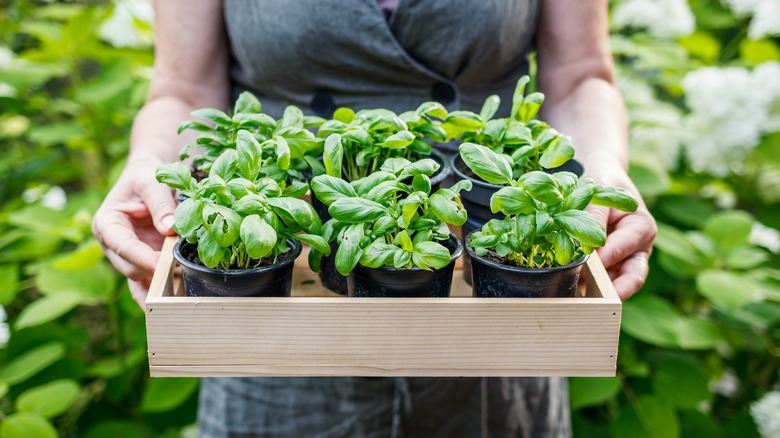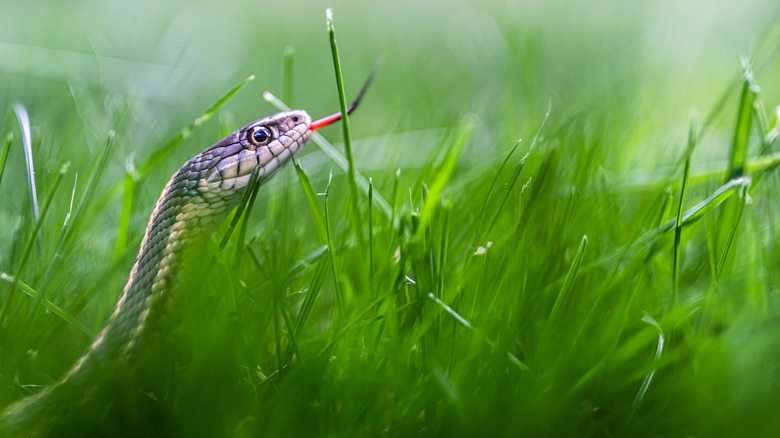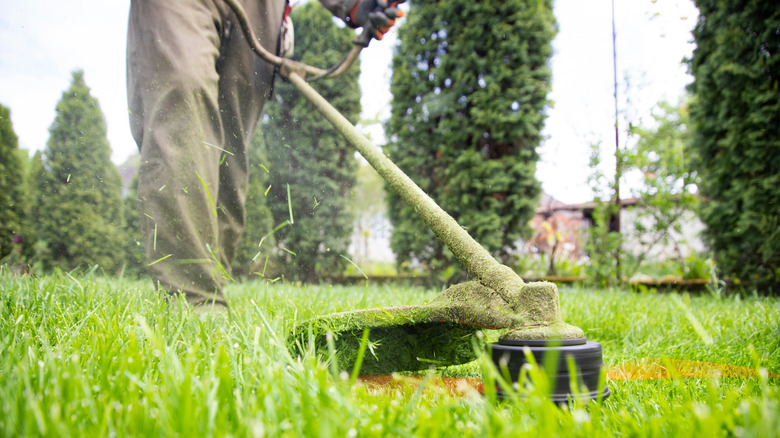Will Planting Basil Really Repel Snakes From Your Yard? Our Scientist Weighs In
If you're looking for a natural way to get rid of snakes in your yard, growing basil is not likely to be a great deterrent. While some sources claim that this herb works to deter snakes because they do not like the smell, the solution to your reptile problems may not be so simple. Dr. Charles van Rees, a conservation scientist and naturalist who operates an educational blog, Gulo in Nature, spoke exclusively with House Digest about basil's effectiveness as a snake repellent.
Dr. van Rees clarified that while snakes certainly will be aware of pungent plants, there is no way to be sure the reptiles will avoid them. "Snakes, like other reptiles, have a decent ability to detect scent via their Jacobson's organ, which provides a sense of taste and smell. So if you plant lots of basil, I'm sure a snake in your backyard will be able to smell it," Dr. van Rees said. "[however] there are no replicated and credible scientific studies proving that any plants can reliably repel snakes. It's as simple as that; very few people have run experiments to test the idea, and those that have did so in ways that only partially answer the question."
Why basil won't get rid of snakes
Though Dr. Charles van Rees explained to House Digest that there have been a few studies that showed snakes avoiding areas with strong natural scents, they didn't provide the full picture of how the animals would respond in the wild. "...even in a very controlled environment, [the researchers] simply tested where snakes spent their time (in smelly versus non-smelly areas, with and without the plant or plant chemical). This captures only half of the equation – another part of deterrence is the motivation of the snake itself."
Snakes are often drawn to yards because they provide access to water, food, and shelter. If these resources are present on your property, snakes are more likely to stick around, even if there's a strong scent of basil in the air. "As with coffee grounds keeping lizards away, this is the sort of solution that pest control gurus will be quick to push on people, but it is not supported by any evidence," Dr. van Rees said. Though it is not a proven repellent, Dr. van Rees suggests that people could try the hack for themselves by planting basil where snakes are spotted and watching to see if it changes the animal's behavior.
Ways to discourage snakes in your yard
Though the snakes on your property probably won't hurt you and are likely afraid of you, having these reptiles in your yard can be unsettling. Basil might not be a sure way to keep snakes out of your yard – but Dr. Charles van Rees exclusively gave House Digest some tips for repelling snakes: "Tall grass, brush piles, boards, and other large objects laying flat on the ground will make great hiding places for snakes, and you should remove them if you don't want reptilian visitors. Try to minimize resources for rodents like voles, rats, and mice by not leaving food out and carefully storing birdseed and garbage; if the rodents don't show up, the snakes won't come looking for them," Dr. van Rees said.
It may be scary to find a slithering reptile hiding in your lawn, but in most cases snakes are harmless. According to The Humane Society, snakes do not pose a risk to humans or pets unless they are venomous, and most are not. If you've only seen a snake once or twice, it might be best to leave them alone and let them kill the other pests outside your home. For serious snake problems or if you're dealing with a venomous variety, contact a professional pest control agency.


